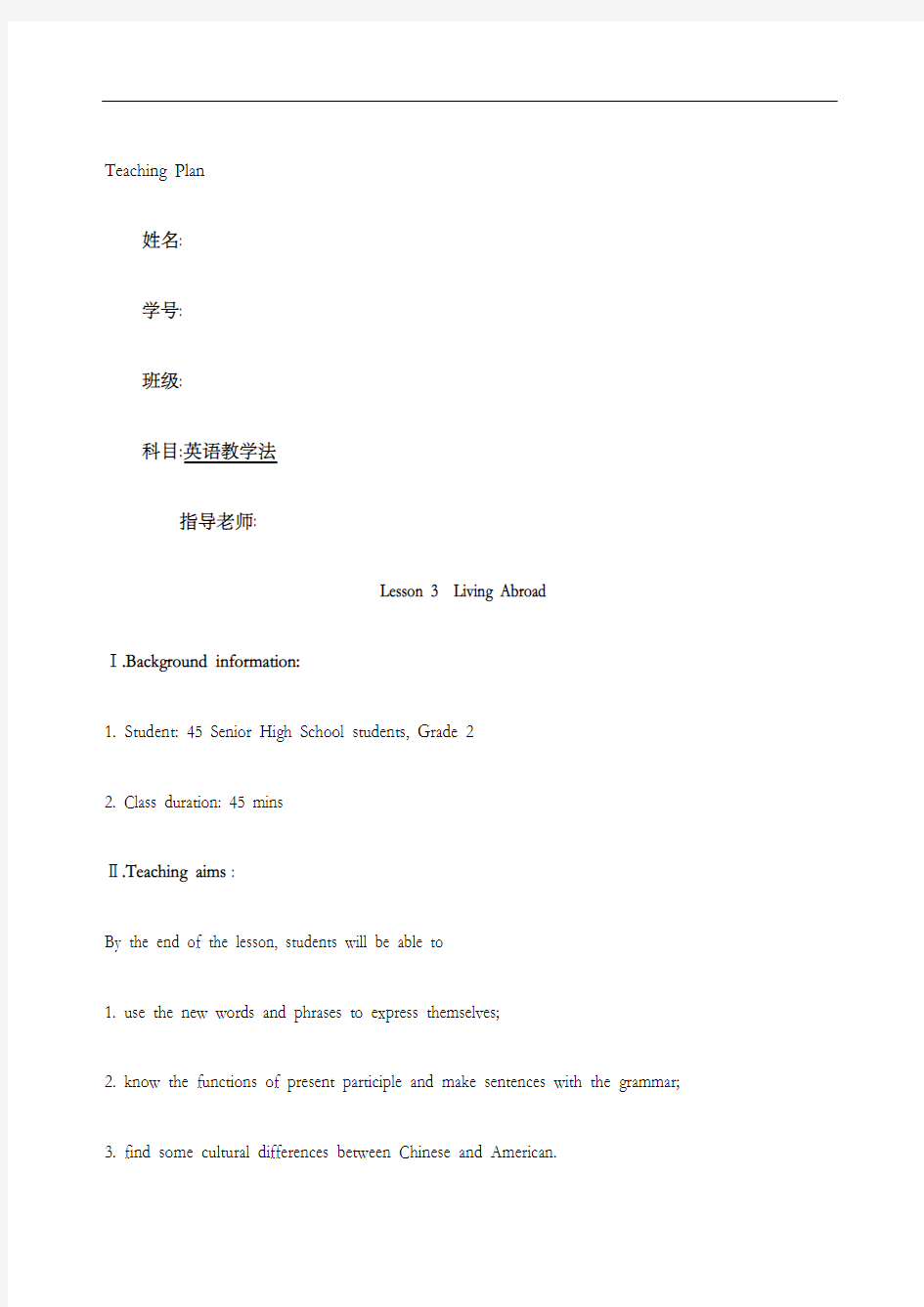

全英文英语教案精编
W O R D版
IBM system office room 【A0816H-A0912AAAHH-GX8Q8-GNTHHJ8】
Teaching Plan
姓名:
学号:
班级:
科目:英语教学法
指导老师:
Lesson 3 Living Abroad
Ⅰ.Background information:
1. Student:45 Senior High School students, Grade 2
2. Class duration: 45 mins
Ⅱ.Teaching aims:
By the end of the lesson, students will be able to
1. use the new words and phrases to express themselves;
2. know the functions of present participle and make sentences with the grammar;
3. find some cultural differences between Chinese and American.
Ⅲ.Teaching contents:
1. vocabulary and phrases that help to express cultural differences, such as embarrassed, embarrassing, exchange, host, hospitable, appetite, modest, stare at, have a difficult time doing sth. insist / keep on doing sth. notice / hear / see sb. doing sth.
2. functions of present participle:
⑴ hear sb. doing sth. (object complement)
⑵ an embarrassing experience (attribute)
⑶ What he did is amazing. (predicate)
⑷ I went back to the room closing the door. (adverbial)
3. some cultural differences between Chinese and American in three different situations.
Ⅳ.Teaching aids: PPT, pictures, paper.
Ⅴ.Teaching procedures:
Step 1. Lead- in
T: Good morning, everyone!
Ss: Good morning, teacher!
T: Today we will learn Lesson 3 Living Abroad. First, let us look at two pictures. (Present the pictures.) The American mouse and the Chinese mouse reply differently when they are praised, one
in a confident way while the other in a modest way. So we will find some other cultural differences between American and Chinese through the lesson.
Step 2. Learn the new words and phrases
T: Before the text, let us learn the new words. Oh, the first two words are embarrassing. Do not worry! Now, we only need to recognize them. “embarrassed” means feeling shy and stupid, and we say sb. feel embarrassed. “embarrassing” refers to making sb. feel shy and stupid, and we say sth. is embarrassing. The subject is different, and you can compare them with “interested” and “interesting”. Understand?
Ss: Yes!
T: Ok! Next, the word “change” means“交换”,while “exchange” refers to“交换或交流”. For example, “cultural exchange” means — (Ask students to translate it.)
Ss: 文化交流.
T: Yes! Then, when foreign friends come to China, we Chinese, as the host or hostess, should be hospitable. (Point at the PPT and say “friendly and generous”.) Appetite---When the host or hostess is hospitable, the guest may feel delighted and have a good appetite (Point at the PPT and say “desire for food”.) Now, the last two words. (Point at the PPT.) Most Chinese are modest. (Point
at the PPT and say “talking little about one’s own ability and achievement) “stare at” means looking at for a long time without moving. Read after me —“embarrassed”.
Ss: embarrassed.
(Read after me: embarrassing, exchange, host, hospitable, appetite, modest, stare at)
T: Do you know how to use the new words in phrases? Let us learn them together. (Next PPT.) No strange words in the phrases, so we start directly. Xxx, the meaning of the first one, please. Student A: 度过一段困难时期
T: Yes, sit down please. This phrase is s imilar to “have difficulty doing sth.” Xxx, the second one, please.
Student B:有一次尴尬经历
T: Right! Sit down, please. “look embarrassed” means “看起来尴尬”. And what about the fourth one?
Ss: 胃口好,有食欲.
T: Good! Then, both “insist on” and “keep on” mean “继续”. The last one! “notice / hear / see + sb. + doing sth.” means “注意到/听到/看到+某人+正在做某事”. (Show the sentences.) Xxx, could you translate the sentences into Chinese for us?
Student C: 我听见她正在唱歌和我听到过她唱歌。
T: Good! Quite clearly. Thank you!
Step 3. Learn the new grammar
T: Let us learn the new grammar—present participle (Show the next PPT.) Firstly, “hear” is the verb; “sb.” is the object; so “doing sth.” is an object complement. (Point at the words “an”, “experience”,“embarrassing”) Article,noun,an attributive adjective!Now, you tell me the function. The third one, Xxx, please.
Student D: “What he did” is the subject. “is” is the verb . “amazing” is predicat e.
T: Well done! “amazing” shows the feature of the subject. (Run out.) Hello! I go back. (Show the paper writing “closing”.) Two actions —“go back”,“close the door” — happen almost at the same time. Right?
Ss: Right.
T:Ok! (Show the PPT.) I went back to the room closing the door. “closing” is adverbial. “closing” shows that, firstly, two actions happened almost at the same time; secondly, it is an active action; thirdly, the two actions share the same subject. Understand ?
Ss: Yes.
T: Good! Now, come to the summary on present participle. Firstly, the form—V+ing, and you have learned the rule in junior high school. Secondly, it can function as attribute and adverbial, and it can also function as object compliment. Thirdly, as predicate,it can show the feature of the subject; and
as for the rest three functions mentioned, it can implicate that an active action happens at the moment.
Step 4. Read the dialogues and finish some tasks.
1. Present the task
T: Now, we will come to the dialogues which tell us the cultural differences. Firstly, bear the two tasks in your mind: A, find the differences in three situations; B, find the use and functions of present participle. Do you know the tasks?
Ss: Yes.
2. Read Zhang San’s view
T: Ok! (Show the pictures.) See the three situations by yourselves. Now, remember the key words: leaving, table, praise. Let us come to dialogue 1 between Chinese. Xxx, read Zhang San’s opinion, please.
Student E: (Read the dialogue)
T: Very good. Thank you! Your deskmate, what is the function of “closing”?
Student F: Adverbial.
T: Yes! Sit down please. Zhang San felt unhappy when his friend closed the door immediately. Have you got it?
Ss: Yes.
3. Read Li Si’s view
T: Xxx, read this dialogue, please. And translate the first two sentences into Chinese.
Student G: (Read the dialogue and then do the translation.) 我曾经在纽约一个餐馆有一次尴尬的经历。当我注意到人们正盯着我们看时,我和朋友正在饭桌上聊天。
T: Quite good. Sit down, please. What does “embarrassing” function as?
Ss: Attribute.
T:What does “staring at us” function as?
Ss: Object complement.
T: You got it! Then, many Chinese are used to chat happily in a loud voice in the restaurant. Li Si may not feel embarrassed in a Chinese restaurant.
4. Read Adam’s view (Show the next PPT.)
T:Now, look through dialogue 2 between Americans. The first is Adam’s view on the table manner. We read it together.
Ss: (Read the dialogue.)
T: Ok! The host was extremely hospitable, and kept on putting more food in the bowl, even though he said no. What does “saying” function as?
Ss: Object complement.
5. Read Bob’s view
T: Good! Please read Bob’s view silently, and find what the father kept on doing. (After a few minutes) Xxx, tell us the answer, please.
Student H: He insisted on walking Bob to the bus station to see him off.
T: Well down! Sit down please. And what does “amazing” function as?
Ss: Adverbial.
T: Very good!
6. Read Cathy’s view(Show Cathy’s dialogue)
T:Look through the dialogue. Here, what does “wearing” functions as?
Ss: Object complement.
T: And what does “saying” function as?
Ss: Adverbial.
T: Good! Chinese may feel shy when praised; however, American often feel happy and say “thanks”. Have you got it?
Ss: Yes!
7. Summarize the cultural differences.
T: Ok! Have a look at the way of being polite in different cultures.
8. Do the exercise.
T: Now, do an exercise on present participle. The left group, please read the first sentence and tell me the function.
The left group: I hear the baby crying. Object complement.
T: Good! The middle group, the second one, please.
The middle group: China is a developing country. Attribute.
T: Exactly! The right group, the third one, please.
The right group: He found the cook saying the dish was too salty. Adverbial.
T: Good job! Do the fourth one together. This situation is —
Ss:“embarrassing”. Predicate.
T: Well done! The last one. I notice her —
Ss:“dancing”. Object complement.
T: Quite good!
Ⅵ. Summary:
T: Today we have learned the new words and phrases, present participle and the four functions, and cultural differences.
Ⅶ. Homework:
T: Please review the lesson and write a short passage to tell the cultural differences between American and Chinese.
Ⅷ. Reflection:
The warming-up was not so good as to attract the attention of the students. And the analysis of the dialogue was not so specific as to make the students familiar with the new knowledge. The student will have the chance to discuss the cultural differences the next class.
Ⅸ.Blackboard design:
Lesson 3 Living Abroad
New words: embarrassed, embarrassing, exchange,
host, hospitable, appetite, modest, stare
New phrases: insist / keep on doing sth.
have a difficult time doing sth.
notice / hear / see sb. doing sth.
Grammar: present participle
1.hear sb. doing sth. (object complement)
2. an embarrassing experience (attribute)
3. What he did is amazing. (predicate)
4. I went back to the room closing the door. (adverbial)Cultural differences:
《英语教学法》教案评分细则